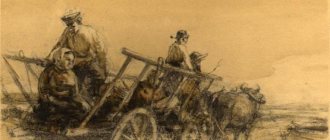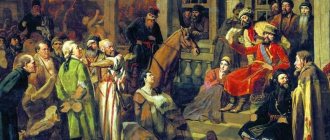- Summary
- Different
- Thus spoke Zarathustra (Nietzsche)
Nietzsche's work "Thus Spake Zarathustra" covers the moral aspects of life. This is a philosophical novel in four parts. This is a deep and interesting book.
In the first part it is said that Zarathustra became wise because he wandered for a long time. He sought to comprehend all knowledge and then convey it to people. The work is based on Zarathustra's worldview and his conclusions. The Prophet lived in the mountains for a long time, but then decided to descend. Below he met a hermit who dedicated his life to serving God. He told Zarathustra that he loved God very much and this feeling gave him strength and energy. Zarathustra was surprised when he heard this. He thought that the hermit did not know that the Almighty had died long ago.
The Prophet moved on. He went to the city to convey his knowledge to people. At this time everyone was watching a circus performance. Zarathustra wanted to tell everyone that there is no need to believe in God because he is dead. People did not support his opinion. Everyone was no longer interested in listening to the prophet, and they continued to watch the performance. Suddenly the tightrope walker falls and breaks. Zarathustra collects its remains and leaves with them.
In the second part, Zarathustra settles in a cave. He lived alone for a long time. Then he again decided to go out to the people and tell them parables. Zarathustra has a negative attitude towards religion.
In this part the prophet tries to expose faith. He is also against equal rights for people. He believes that it is wrong to humiliate strong people in this way, and elevate the weak. Zarathustra believed that people are not the same and are not equal to each other. Everyone is trying to seize power. That is why strong people should rule the world and weak people should obey them.
He doesn't like the rules and foundations by which people live. He criticizes the work of many philosophers and poets. He considers them deceitful.
In the third part, the sage continues to tell his stories. He constantly comes up with different images to convey his thoughts. In this chapter Zarathustra tells us about a demon who appears near a child when he is born. He calls it the Spirit of Heaviness. Zarathustra saw the demon when he wanted to drag him into the swamp of doubts. Getting rid of the Spirit of Heaviness is quite difficult. Evil and Good are illusory concepts, according to Zarathustra. A person should only do what he wants. Zarathustra recommends not hiding your desires and living as your heart dictates. Every day you need to do something that will allow your dream to come true.
The prophet is against generally accepted living standards and principles. He wants each individual to have his own individual path in life. Each person has his own understanding of morals, ethics and rules of conduct. Accidents have a huge impact on a person's fate.
Zarathustra believes that people should love themselves and be powerful. He is against established norms of behavior in society. He believes that strength is the most important thing and thanks to it you can seize power.
In the fourth chapter, Zarathustra is already very old. But despite this, faith and truth have not changed. He stuck to his convictions. He continues to believe that one who behaves naturally can become a superman. His main slogan that he wants to convey to people is: “Be yourself!”
The Prophet, emerging from his cave, met a lot of extraordinary characters. He invited everyone to visit him, and they came. Zarathustra told his listeners his ideas and philosophical conclusions. In the evening they sat down to dinner, and all the guests praised Zarathustra for his teachings. The next morning the prophet leaves his home.
What followed was a continuation of the novel. But Nietzsche did not have time to finish it.
Reader's diary.
Other works by the author: ← The Fourth Height (Ilyina)↑ VariousElder Edda →
Part 1
The Prophet Zarathustra wandered for many years and gained wisdom. He managed to learn what is inaccessible to many and strives to share these revelations with humanity. The book is a novel skillfully intertwined with philosophy. The worldview of the prophet is the basis of the entire novel, its deep essence. The hero descends from the mountains where he had been for many years. And he meets a hermit who devoted himself to serving God. He tells Zarathustra about his love for the Almighty and how this feeling fills him, carrying energy and strength. His words surprise the prophet, who does not understand why the hermit does not know about the death of God.
Zarathustra continues on his way. He returns to the city to share his knowledge with people. He comes to the city at a time when a large crowd of people is watching a circus performance. The Wanderer tells the people about the superman, as the highest form of human development. The prophet also calls on people to stop believing in God, claiming that he is dead. However, his ideas do not resonate with people, causing only ridicule. People turn their attention to the tightrope walker's performance. Suddenly he loses his balance and flies down. Zarathustra takes his remains with him and leaves the city. He is accompanied by a Snake and an Eagle.
The idea of a superman
Nietzsche's book is divided into four parts, each of which the author published separately. The writer was going to take on two more volumes, but did not have time to bring his idea to life. Each part contains several parables. This is what the summary talks about. “Thus Spoke Zarathustra” begins with the scene of Zarathustra’s return to people after many years of wandering. The main character is a prophet. His fixed idea is to inform people about his own revelation.
The philosophy of the prophet is the semantic core on which the book “Thus Spoke Zarathustra” rests. The idea of a superman, promoted by the main character, became the most popular and famous theory of Nietzsche himself. The main message of the work is given already in the first scene, when Zarathustra descends from the mountains. On the way he meets a hermit. This man admits that he loves God, and this feeling gives him strength to live. The scene is not accidental. After this meeting, the prophet moves on and wonders why the hermit does not yet know that God is dead. He denies many norms that are familiar to ordinary people. This idea is conveyed both by the book itself and its summary. “Thus Spake Zarathustra” is also a treatise on the place of man in nature and society.
Part 2
After some time, Zarathustra again becomes a recluse. He settles in a cave and lives there.
Many years pass when he again decides to share his knowledge with people. He tells them parables. The sage speaks caustically about religion and the church.
This part of the book is replete with quotations that expose faith. He also ridicules the idea of equal rights for people, claiming that it was invented by the church in order to punish strong people and exalt the weak. People are not equal and should not be equal - this is his firm conviction. All living beings strive for power. And this desire is stronger and more important than even such a strong and basic desire of any person as the desire to live. Therefore, the weak must be repaired, and the strong must be subdued. The prophet calls on people to focus their energy on creation instead of showing compassion to others.
Most social foundations and rules are criticized by the former recluse. He claims that the revered sages are false because they do not have knowledge, but only pander to the superstition of the uneducated people. True wisdom appears far from the bustle of the city. And she sees the world as it is, without false illusions. He also ridicules poets, considering them unmanly and frivolous people.
Part 3
The sage tells new stories. He is looking for new images to convey his ideas. He shares the story of the Spirit of Heaviness, a demonic creature that appears next to a baby shortly after birth. He looks like a nasty little mole. One day he tried to drag Zarathustra into the abyss of doubt. It was very difficult to get rid of him. The concepts of Evil and Good are the machinations of this demon. In fact, these concepts do not exist, they are illusory. Only natural human desires are of real value. They cannot be hidden and suppressed, but one should strive to realize them.
The Prophet denies any principles of a common, universal path. The speaker talks about a personal, unique path for each individual. And therefore, everyone must form their own vision of ethics, morality, morality. The fate of any person is a kind of tangle of accidents.
The hero of the novel is admired by selfishness, power, and sensuality. He considers these qualities to be natural manifestations of a healthy personality. Such a person is free from any rules and dogmas. Zarathustra generally denies the need for any laws or rules in the structure of a healthy society. The only thing that matters is strength. And only thanks to it can the natural order of the triumph of strong individuals over weak people be established.
Philosophy of Zarathustra
Zarathustra has his “Collection of Speeches”, consisting of 22 parables. They are the ones who reveal the main ideas that Friedrich Nietzsche is trying to convey to readers. Zarathustra despises priests and teaches soldiers to respect them. He considers the state an “idol” and explains that only after its fall will the era of a new man begin. The philosopher urges people to avoid actors, jesters and fame. He criticizes the Christian postulate that one must respond to evil with good, considering such behavior to be weakness.
Zarathustra tells most of his theses to passers-by and random companions. Thus, with one young man he shares the idea that evil occupies a significant place in human nature, and only by overcoming it can he become a superman. Of all the theses of the prophet, one stands out in particular. It is the basis of the faith described in the book Thus Spoke Zarathustra. Analysis shows that the most important part of the philosopher’s mythology is his prophecy about the coming of the Great Noon. This event will precede a person’s transition to a new stage of his development. When Great Noon arrives, people will celebrate the end of their former half-existence.
Part 4
Zarathustra grew old. His ideals and beliefs have not changed at all. He still preaches that one can become a Superman only when a person becomes who he really is. "Be yourself!" - this is the main slogan of the worthy old man.
Once a sage left his cave dwelling, hastening to answer a cry for help. On his way he encounters a lot of interesting characters. This is the Soothsayer, and the Sorcerer, and the Conscientious in Spirit, and the Ugliest Man, and the Shadow, and the Beggar. He invites all these personalities to visit him. They respond to his invitation.
In his cave, the prophet shares with them the same stories, quotes and conclusions that he previously presented to the human crowd. This story is a kind of summary summary. Here, all these phrases scattered throughout the volumes are combined to form a clear, structured teaching.
Next comes a description of the supper, which is very reminiscent of the Gospel supper. Here guests eat meat, pray and extol the teachings of Zarathustra. Then he announces the imminent arrival of the Great Noon. The next day, early in the morning, the sage leaves his cave. This is the end of the book.
Nietzsche planned to write a sequel to the novel, but was never able to fulfill his plan.
You can use this text for a reader's diary
Travel to the city
The wandering philosopher Zarathustra is delivering his first sermon in the city when he comes across a crowd gathered around a tightrope dancer. The traveler tells people about the superman, he convinces that an ordinary person is only a link in the chain of development from a monkey to a superman. In addition, Zarathustra publicly announces that God is dead and therefore people should stop believing in unearthly hopes and become faithful to the earth.
The stranger's speech amuses the crowd. She makes fun of the philosopher and continues to watch the performance. A summary cannot do without mentioning this scene. Thus Spake Zarathustra, although a philosophical treatise, at the same time has all the signs of a novel with a developing plot and fictional characters. The scene in the city ends with the tightrope walker falling to the ground and dying. The sage picks up his body and leaves the city in the company of the Snake and Eagle.
Mockery of wisdom and culture
Through the mouth of Zarathustra, Nietzsche says that all the so-called sages only serve the uneducated people and their superstitions, while interfering with the truth. Its real bearers do not live in cities among the crowd, but in distant deserts, away from the bustle of humanity. Part of the truth is that all living things strive for power in one way or another. It is precisely because of this pattern that the weak must submit to the strong. Zarathustra considers the will to power to be a much more important human quality than the will to live.
Criticism of culture is another characteristic feature of the book Thus Spoke Zarathustra. Feedback from contemporaries shows how disgusted they were with Nietzsche, who considered most of human heritage to be only the result of worship of an illusory fictional reality. For example, Zarathustra openly laughs at poets whom he calls too feminine and superficial.
Spirit of Heaviness
In the third part of the philosophical novel, Zarathustra appears with new parables and images. He tells his few listeners about the Spirit of Heaviness - a creature that resembles either a dwarf or a mole, trying to make the sage lame. This demon tried to drag Zarathustra to the bottom, into an abyss full of doubts. And only at the cost of great efforts did the main character manage to escape.
The speaker explains to the audience that the Spirit of Heaviness is given to every person from birth. Periodically, he reminds himself of himself in the form of the words “evil” and “good.” Zarathustra denies these concepts. He believes that there is no good or evil. There are only natural desires of every person, which should not be hidden under any circumstances.
An ideal person
According to the ideas of Zarathustra, in order to become strong, it is enough to learn to be free from any external circumstances. Truly powerful people can afford to constantly throw themselves into random situations. Strength must be shown in everything. Men must always be ready for war, and women must always be ready to bear children.
One of Zarathustra’s theses states that society and any social contract are unnecessary. Attempts to live together according to some rules only prevent the strong from triumphing over the weak.
Quotes
In the second part of the book, after a short life in public, Zarathustra decides to once again seclude himself in his cave, where he spends many more years. Returning from a long imprisonment, he again speaks to people with parables. Criticism of religion is one of the main messages of the book Thus Spoke Zarathustra. Quotes on this topic can be given in huge quantities. For example:
- “God is the thought that makes everything straight crooked and everything that stands rotating.”
- “I call this whole teaching about the one, complete, immovable, well-fed and imperishable, evil and hostile to man!”
- “If there were gods, how could I resist not being a god! Therefore there are no gods."
The philosopher ridicules the equality of people. He believes that this concept is a fiction, invented to punish the strong and exalt the weak. Based on this, the prophet calls for abandoning compassion for the sake of creation. People shouldn't be equal. Nietzsche repeats this thought several times on the pages of his book Thus Spoke Zarathustra. The contents of the chapters show how he consistently criticizes all the foundations and orders familiar to society.
Attitude to fate and vices
The book “Thus Spoke Zarathustra,” the meaning of which is interpreted differently by philosophers and other researchers, invites the reader to take a new look at seemingly familiar things. For example, the main character refuses to talk about a certain universal path - a universal method of salvation and correct life, which is discussed in all popular religious teachings. On the contrary, Zarathustra believes that each person has his own path, and everyone should form their attitude to morality in their own way.
The prophet explains any fate as just a combination of accidents. He praises such traits as lust for power, voluptuousness and selfishness, considering them just healthy natural passions inherent in a strong soul in an exalted body. Predicting the next era of supermen, Zarathustra hopes that all these character traits will be inherent in a new type of person.





